Image Security
Available as of v1.4.0
Harvester allows you to encrypt and decrypt virtual machine images. The encryption mechanism utilizes the Linux kernel module dm_crypt and the command-line utility cryptsetup.
Prerequisites
Prepare the following resources:
-
Source virtual machine image: You can upload or create an image using any of the supported methods.
cautionDo not upload an encrypted image.
-
Secret: A Kubernetes secret is used as the passphrase of dm_crypt. You must specify the value of the
CRYPTO_KEY_VALUEfield. All other fields are fixed.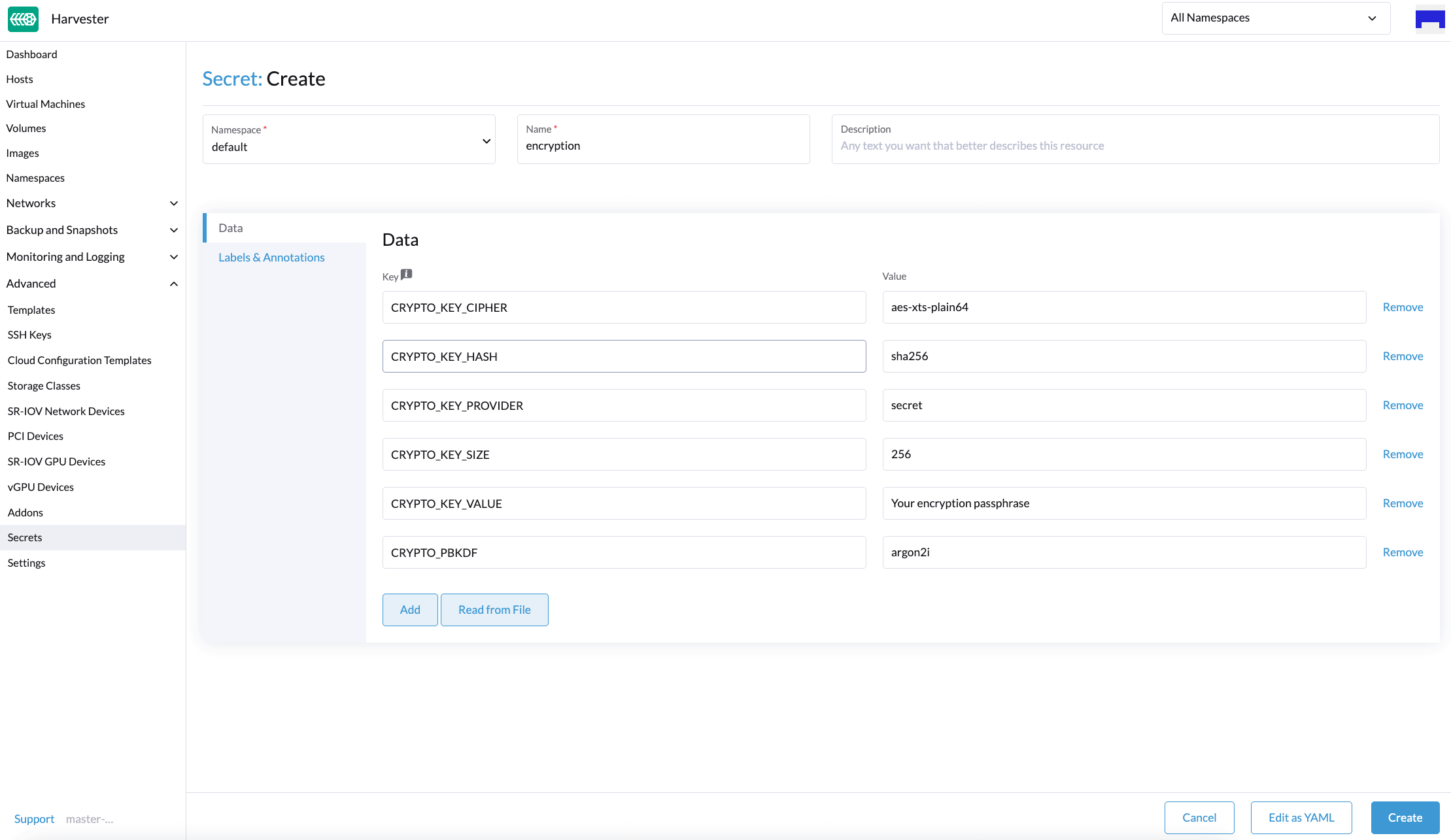
Example of a secret:
apiVersion: v1
kind: Secret
metadata:
name: encryption
namespace: default
data:
CRYPTO_KEY_CIPHER: aes-xts-plain64
CRYPTO_KEY_HASH: sha256
CRYPTO_KEY_PROVIDER: secret
CRYPTO_KEY_SIZE: 256
CRYPTO_KEY_VALUE: "Your encryption passphrase"
CRYPTO_PBKDF: argon2iimportantThe example contains the default YAML code for Kubernetes secrets. Aside from this, you can use encryption options for LUKS mode, which is a cryptsetup operating mode. Harvester v1.4.1 and later versions support these options, but you must verify that these are supported by your nodes.
Option Possible Values CRYPTO_KEY_CIPHER aes-xts-plain, aes-xts-plain64, aes-cbc-plain, aes-cbc-plain64, aes-cbc-essiv:sha256 CRYPTO_KEY_HASH sha256, sha384, sha512 CRYPTO_KEY_SIZE 256, 384, 512 CRYPTO_PBKDF argon2i, argon2id, pbkdf2 You can create a secret in the system namespace using kubectl or the Harvester UI (Edit as YAML feature). Resources in the system namespace are not displayed on the Harvester UI Secrets screen.
-
StorageClass: Images are encrypted using Longhorn, so required fields must be passed to the Longhorn CSI Driver. You can specify the encryption secret when creating a StorageClass. For more information, see Image StorageClass.
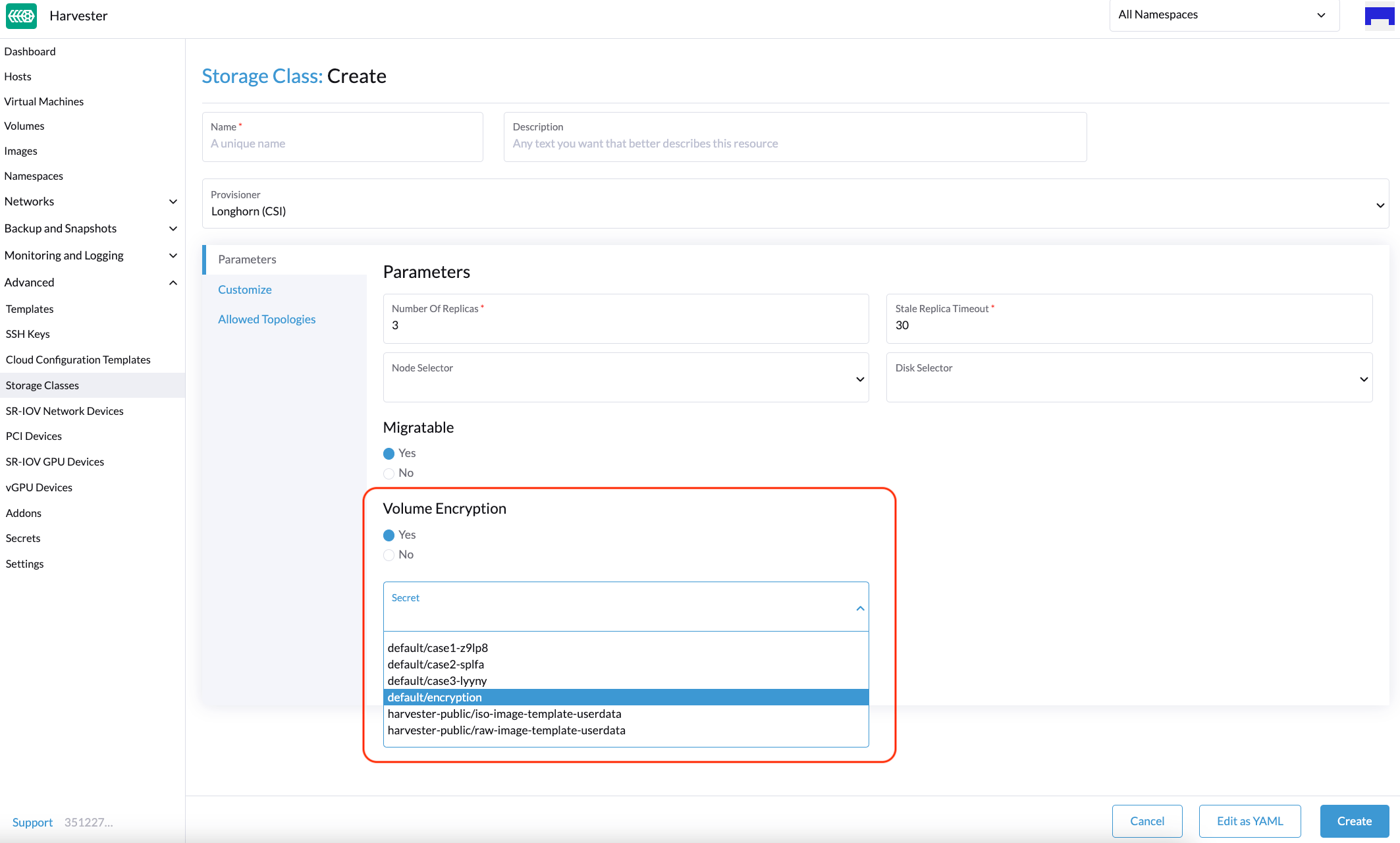
Example of a StorageClass:
allowVolumeExpansion: true
apiVersion: storage.k8s.io/v1
kind: StorageClass
metadata:
name: encryption
parameters:
csi.storage.k8s.io/node-publish-secret-name: encryption
csi.storage.k8s.io/node-publish-secret-namespace: default
csi.storage.k8s.io/node-stage-secret-name: encryption
csi.storage.k8s.io/node-stage-secret-namespace: default
csi.storage.k8s.io/provisioner-secret-name: encryption
csi.storage.k8s.io/provisioner-secret-namespace: default
encrypted: "true"
migratable: "true"
numberOfReplicas: "3"
staleReplicaTimeout: "2880"
provisioner: driver.longhorn.io
reclaimPolicy: Delete
volumeBindingMode: ImmediateimportantYou can create a secret in the system namespace using the Harvester UI (Edit as YAML feature) and kubectl. Resources in the system namespace are not displayed on the Harvester UI Secrets screen.
Encrypt a Virtual Machine Image
-
On the Harvester UI, go to Images.
-
Click Create.
-
Specify a namespace and a name.
-
On the Basics tab, select Encrypt and then select a source image.

- On the Storage tab, select a StorageClass that includes encryption-related fields.
Harvester passes the required fields to Longhorn.

- Click Create.
Decrypt a Virtual Machine Image
-
On the Harvester UI, go to Images.
-
Click Create.
-
Specify a namespace and a name.
-
On the Basics tab, select Decrypt and then select a source image.

- On the Storage tab, select harvester-longhorn (Default) or another commonly used StorageClass.
Harvester uses the StorageClass of the source image that you want to decrypt.

- Click Create.
Use an Image with Encrypted Volumes
You must select the image that you want to use when creating a virtual machine.
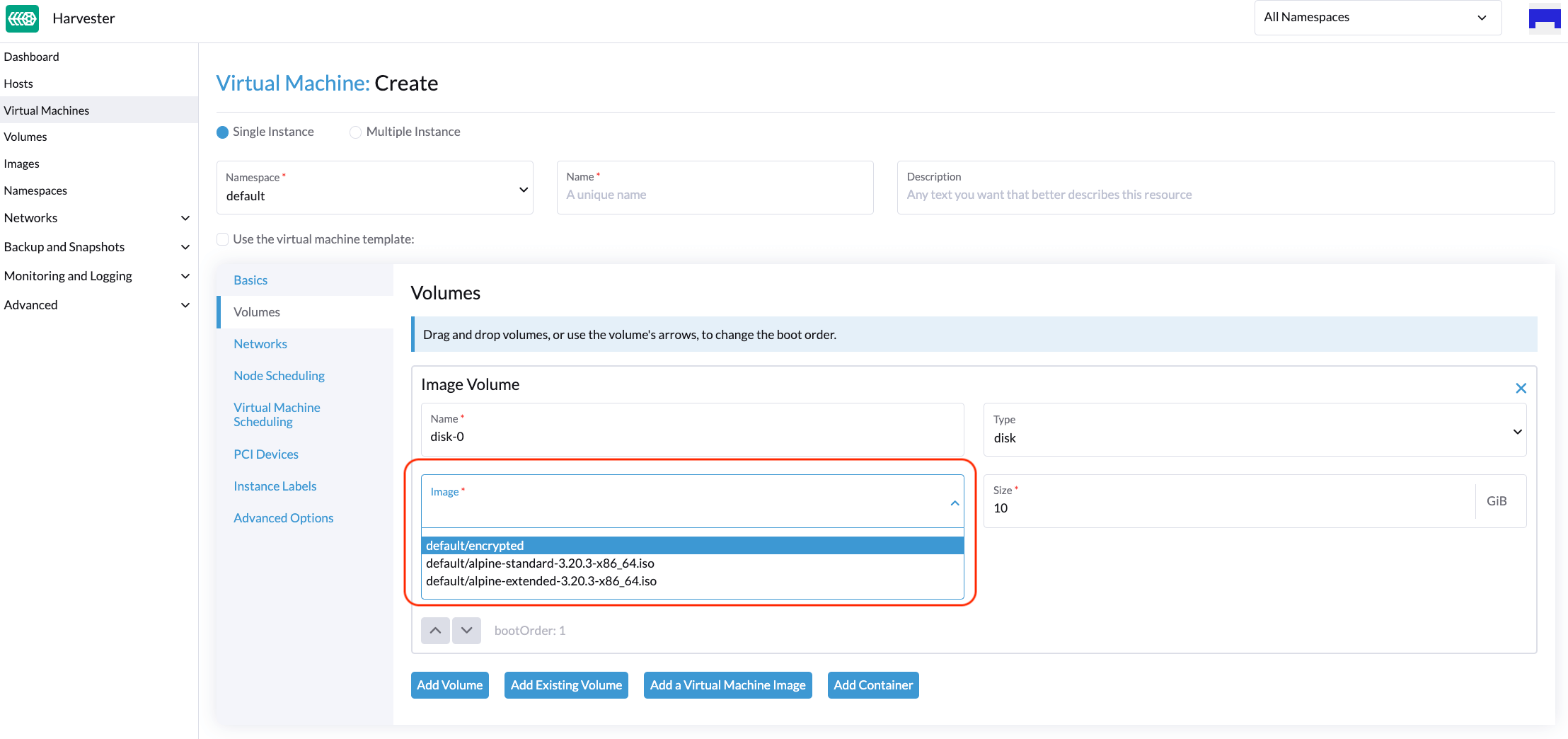
The Virtual Machines screen displays the following icons and messages when volumes used by virtual machines are encrypted.
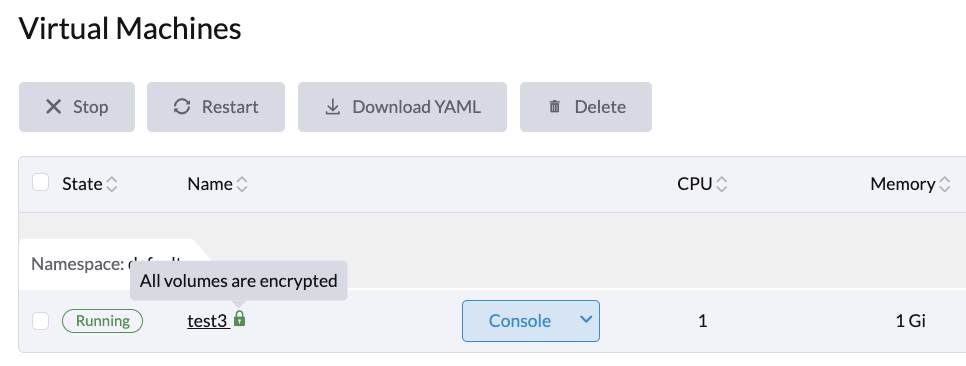
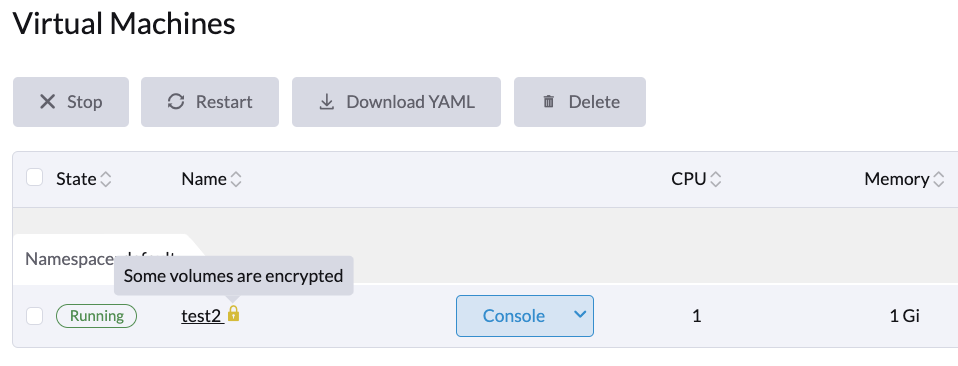
To determine which volumes are encrypted, check the Volumes tab on the Virtual Machine details screen.
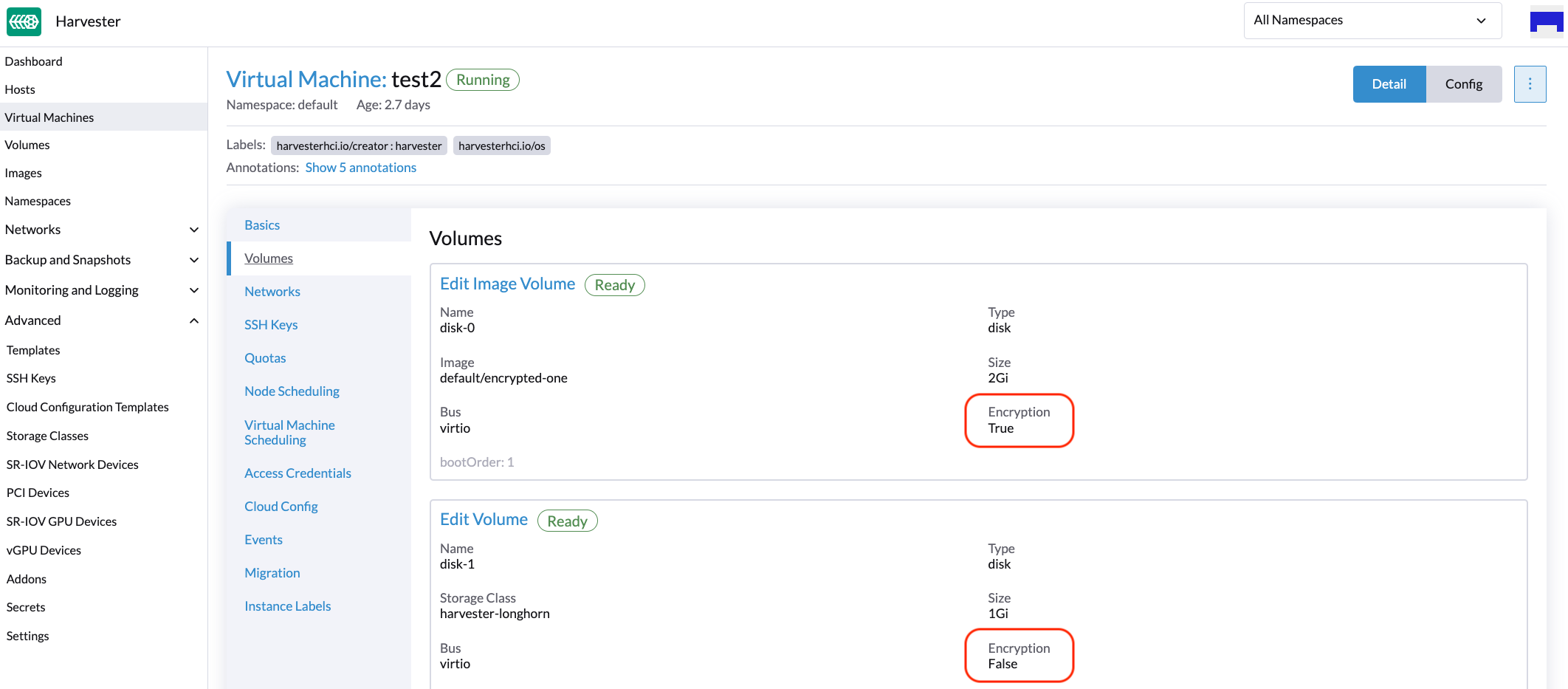
Advanced Usage with Rancher Integration
The secret is an unencrypted Base64-encoded string. To keep the secret safe, you can use projects and namespaces to isolate permissions. For more information, see Multi-Tenancy.
Limitations
You cannot perform the following actions:
- Export a new image from an encrypted image
- Download an encrypted image
- Upload an encrypted image